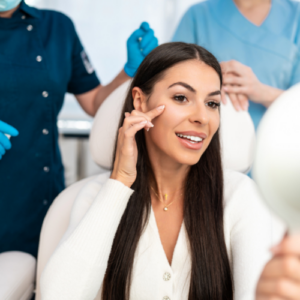Ask the Dermatologist: Caring for Your Little One’s Skin
Many a parent has looked at the large section of baby skincare products in their local pharmacy or Target and been overwhelmed by the vast selection. In addition, there seem to be countless blogs, each with a mind-boggling array of suggestions and well-meaning advice. How is a parent to know which products are best for their child?
California Skin Institute triple board-certified dermatologist, Dr Jennifer Sorrell, answers some common questions about best skincare practices for parents.
Q: How can I identify a good tear-free cleanser and shampoo for infants and children?
A: With so many choices, it can be challenging. I feel that the best products have minimal ingredients and are fragrance free. It may be tempting to select items that smell good, but remember that babies and children have more sensitive skin and fragrance can be a huge irritant. Always scan the ingredient list for hidden scents, bearing in mind that “fragrance” or “parfum” stands for a mix of ingredients. Because companies are exempt from disclosing what goes into their “signature scent”, they aren’t required to list their fragrance ingredients on the label — even if they can be irritating.
Johnson & Johnson products are classic baby shower gifts and hospital goodies that are thought of as gentle. However, all of their cleansers contain the number one trigger of eczema — fragrance! I recommend CeraVe Baby Wash & Shampoo or Baby Dove Sensitive Moisture Tip to Toe Wash, both fragrance free.
Q: Are natural products better for my child’s skin?
A: It’s important to remember that, while “natural” and “organic” may be marketed as better, they are not necessarily gentle. In fact, some herbal essences that seem like they should be soothing, like lavender and chamomile, can actually lead to irritation in babies with sensitive skin.
Q: Do I need to moisturize my baby?
A: Not all children need a moisturizer, though massaging some onto your child’s skin can be a wonderful, relaxing addition to their bedtime routine. Children with eczema or rashy skin can benefit from a cream or even an ointment moisturizer twice daily to help replenish their skin barrier. New research is in the works indicating that, if a baby is at risk of childhood eczema, you should consider moisturizing them daily during infancy to reduce the chance that eczema will develop.
Finally, I find that when babies are teething and drooling more, saliva collects on the cheeks, chin and chest where it often causes an eczema rash. Proactively coating these areas with plain petroleum jelly a few times daily may help.
Q: What about sunscreen for my child? It’s really hard to get them to hold still while I apply it. Do you have any tips?
A: Before 6 months of age, I encourage parents to practice sun avoidance. I recommend reserving sunscreen for use after 6 months of age. The best type for children is a physical sunscreen, and I prefer one containing zinc oxide. This physically blocks solar UVA and UVB rays from harming your child’s skin. Sun-protective clothing, like hats and long-sleeved UV swim shirts, can also be very effective. If your child is so squirmy that thorough sunscreen application is nearly impossible, the clothing can be even more important to your child’s protection. Set a good example by wearing a hat and sun-protective clothing yourself. It may help encourage your child to do the same.
Q: My baby has bad diaper rash! What can I do to make it go away?
A: Depending on the severity, you may need to see a dermatologist. Once diaper rash has flared up, I recommend a bland zinc oxide ointment. Apply it like frosting to the entire diaper area with each diaper change. A temporary switch from cloth diapers to disposable can also be helpful, as diapers that are highly absorbent are better for keeping your baby dry. In order to avoid making diaper rash worse, use fragrance-free baby wipes and do not aggressively wipe the diaper area.
You may be able to prevent a rash from happening in the first place, by applying a layer of plain petroleum jelly with every diaper change.
If you have additional questions or want your little one to be seen by an expert, make an appointment to see Dr Sorrell at California Skin Institute’s San Francisco or San Mateo office. Inconvenient locations for you? Schedule time with a different board-certified dermatologist at any of our California locations near you.



 / 291 Reviews
/ 291 Reviews